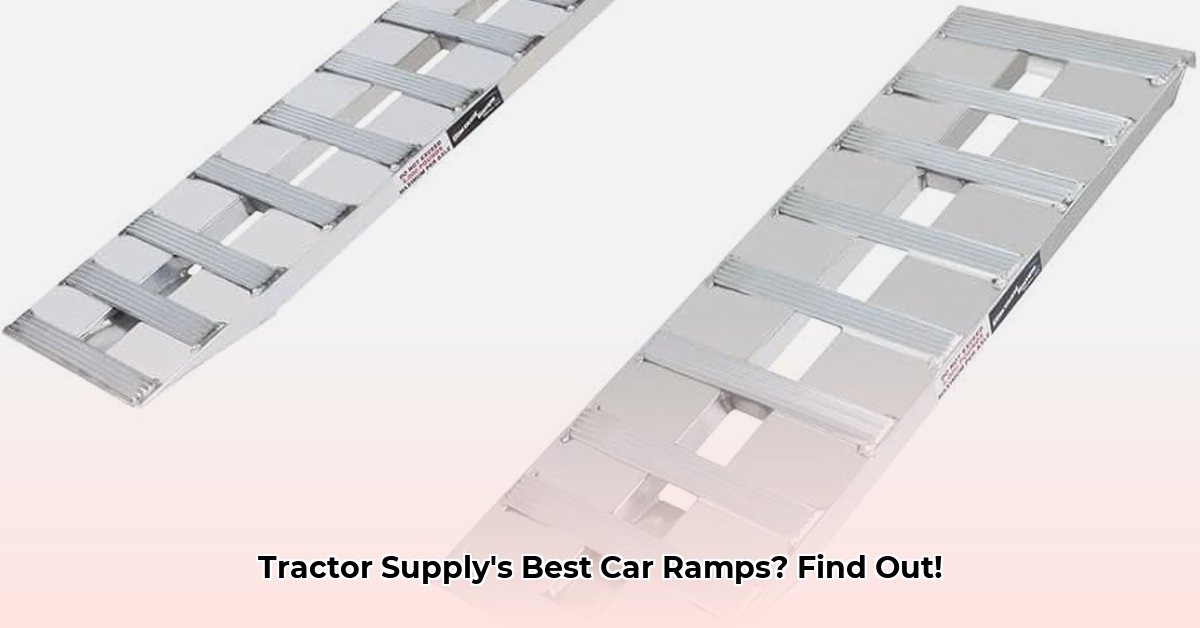
Choosing the right car ramps can be tricky. Whether you're a seasoned mechanic or a weekend DIYer, selecting the wrong ramps can lead to frustration, damage, or even injury. This comprehensive guide will help you navigate the world of car ramps at Tractor Supply, ensuring you choose the safest and most effective option for your needs.
Choosing the Right Car Ramps: Steel vs. Aluminum
The first major decision is the material: steel or aluminum? Both offer distinct advantages and disadvantages.
Steel Ramps:
- Pros: Superior weight capacity, exceptional durability, and resistance to harsh conditions (ideal for outdoor storage). They're less prone to bending or buckling under heavy loads.
- Cons: Heavier and less portable than aluminum ramps. Require more storage space and are generally more expensive.
Aluminum Ramps:
- Pros: Lightweight and easy to handle, transport, and store. More affordable than steel ramps, making them suitable for occasional use.
- Cons: Lower weight capacity compared to steel. May not be ideal for extremely heavy vehicles or frequent, intense use. Durability may be slightly less in very harsh conditions.
Making the Right Choice: Before heading to Tractor Supply, consult your vehicle's owner's manual to determine its curb weight (weight without passengers or cargo). This is essential for selecting a ramp with adequate weight capacity. Always choose a ramp with a weight capacity significantly exceeding your vehicle's weight—safety is paramount!
Key Features for Safe and Efficient Lifting
Beyond material, several crucial features enhance safety and convenience:
- Ramp Length: Longer ramps create a gentler incline, improving ease of access, especially for low-clearance vehicles. A shallower angle reduces the risk of undercarriage damage.
- Surface Texture: Look for ramps with textured surfaces to ensure maximum grip and minimize slippage, particularly on wet or icy surfaces. This significantly improves safety.
- Wheel Stops: These prevent accidental rolling during vehicle loading and unloading. Essential for safety.
- Weight Capacity: The most crucial feature. Always verify that the weight capacity significantly exceeds your vehicle's weight.
- Construction: Examine the ramps for any signs of weakness or damage. Solid construction is vital for safety and longevity. Look for robust welds and reinforced edges.
A Step-by-Step Guide to Safe Ramp Usage
Following these steps minimizes the risk of accidents:
- Preparation: Choose a level, solid surface free of debris. Ensure ample space around the ramps. Firmly engage your parking brake.
- Slow and Steady: Drive onto the ramps slowly and deliberately. Avoid sudden movements. Maintain complete control.
- Secure Your Vehicle: Once on the ramps, utilize wheel chocks (if provided) for added security, preventing accidental rolling.
- Controlled Descent: When removing your vehicle, reverse the process slowly and cautiously. Never rush.
Tractor Supply's Ramp Selection
Tractor Supply offers a varied selection of car ramps to suit different budgets and vehicle types. Consult their website (1) or visit a local store to compare models and find the best fit for your needs. Don't hesitate to ask staff for assistance; they can offer valuable advice. Always carefully review product specifications before purchasing.
Choosing the Best Heavy-Duty Ramps for Agricultural Use
For agricultural applications, selecting a heavy-duty ramp requires careful consideration. Weight capacity, ramp material, and design all play crucial roles in ensuring safe and efficient operation.
Assessing Your Agricultural Needs
Before making a purchase, accurately assess your needs:
- Maximum Vehicle Weight: Determine the weight of the heaviest vehicle you'll be using the ramps with. Select a ramp with a weight capacity significantly exceeding this weight.
- Frequency of Use: Daily use demands exceptionally durable ramps; occasional use provides more flexibility in material and cost.
- Storage Space: Folding ramps save significant space compared to their fixed counterparts.
- Operating Conditions: Consider the terrain. Stable, level ground requires a different approach than soft or uneven surfaces.
Material Selection: Steel vs. Aluminum (Agricultural Use)
Steel offers superior strength and longevity, making it suitable for heavier equipment and frequent use. However, it's prone to rust. Aluminum provides lightweight portability and corrosion resistance but often has a lower weight capacity.
Ramp Design: Straight, Arched, and Folding
Straight ramps offer simplicity and stability, requiring more space. Arched ramps provide a gentler incline, better suited for low-clearance vehicles. Folding ramps save space but may be less stable with heavier loads.
Essential Features for Heavy-Duty Ramps
- Oversized Weight Capacity: Always select ramps with a weight capacity that significantly exceeds the weight of your heaviest vehicle.
- Extended Ramp Length: Longer ramps create gentler inclines, improving safety and ease of operation.
- Non-Slip Surface: Textured surfaces are critical for preventing slippage.
- Robust Construction: Inspect the ramps for welds and sturdy edges.
- Appropriate Width: Ensure the ramp's width comfortably accommodates your vehicle's wheelbase.
Tractor Supply's Heavy-Duty Ramp Selection
Tractor Supply typically carries a selection of heavy-duty ramps suitable for agricultural use. Browse their online catalog or visit your local store to compare models and read customer reviews.
Prioritizing Safety
Always use ramps on level, firm ground. Keep the ramp surface clean and dry. Never exceed the weight limit. Employ wheel chocks to secure the vehicle. Exercise extreme caution during operation. Remember, prioritizing safety ensures smooth operation and prevents accidents.